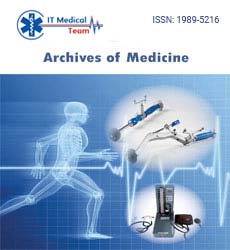John Uchytil*
Hudson High School, Hudson, Wisconsin, USA
Corresponding Author:
John Uchytil
Hudson High School, Hudson, Wisconsin, USA
E-mail: johnnyuch22@gmail.com
Tel: 7153863408
Editorial
A fountain of youth. A magic bullet. The search for a do-all-endall to health issues and a long life has been on the minds of people since the beginning of time. The average age of death has increased over the past century at an incredible rate. But what halts our ever-present lust for longevity? The ethical dilemma. It is believed that Nazi Germany may have found cures for diseases and other health miracles, but those discoveries cannot be validated or used due to a lack of ethics in their research. Currently a large topic for debate is human stem cell research. It has been shown that human stem cells can be the answer to many problems including growing organs and halting muscle deterioration.
The main ethical argument surrounding the use of stem cells treatment is the process by which stem cells are extracted. Stem cells are taken from a fertilized egg. After the stem cells are taken, the egg is essentially destroyed. This has caused members of the Catholic Church among many others to question if this process is considered as killing a human. Other groups support the extraction of stem cells saying that the fertilized egg has not yet become a living organism and, therefore, is not being killed. This argument revisits the court case Row v. Wade of 1973 regarding women and the use of contraceptives. Is it woman’s/a family’s choice to give consent to have their eggs used or should stem cell extraction be illegal because it is murder?
Stem cell research has a multitude of positive effects including regenerating bone, developing insulin-producing cells for type 1 diabetes, and repairing damaged heart muscle following a heart attack with cardiac muscle cells just to name a few. The possibilities for stem cell treatments seem nearly endless. After the implementation of stem cell treatments, the average life expectancy is expected to jump significantly again. With such a multitude of possibilities, there will only be more developments in the production and use for human stem cells.
Recently discoveries have been made in the field of stem cell research. It has been found that stem cells can be extracted from the skin of mice and bones f adults instead of the fertilized eggs of women. These finding have opened up a new avenue for the field almost totally subsiding the argument against, as the Westboro Baptist Church says, “Eating our children.” The amount of stem cells able to be derived from mouse skin and adult bone marrow is significantly less that in fertilized eggs, but scientists have come up with different ways of getting the cells in larger amounts and by much more simple means. Hopefully this is opening a bright door to the future. This simplicity could open up doors to stem cell donation centers where patients will give there stem cells to hospitals, becoming almost like blood drives.
It is up to us to prevent professionals from covering our eyes and taking stem cells from unwilling, living patients. Ethical issues could arise with expense of extracting stem cells. If getting stem cells cost too much, doctors could take illegal measures in an attempt to get paid more. At this time, that is the only ethical dilemma is how the doctors treat their patients which can be easily stopped with the cooperation of that patient. In the event of a doctor taking advantage of a patient wishing to have stem cell treatment or a patient willing to give stem cells to the hospital, anyone able to should phone authorities to prevent the dirty doctors from becoming a prevalent problem. At this time, no issues have been documented.
6483






